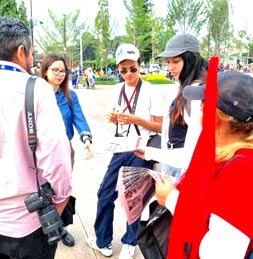
One Hour: Workers’ Lives or Bosses’ Profits? We Need Communist Production Based on Solidarity and Workers’ Quality of Life
EL SALVADOR, July 7— “They can’t let us leave one hour early, knowing that we are on red alert?” said an outraged factory worker. “They would rather lose a human life than lose an hour of production!”
This country was in a state of high alert due to heavy rains that endangered the lives of workers and their families. Reports said that streets were flooded, with several landslides, falling trees, and that several people had died, buried by the landslides.
Capitalism’s thirst for profits has caused global warming worldwide. The bosses’ system, which only brings destruction and death to the working class, must be destroyed!
“All this while the profit-hungry, exploitative bosses ordered, on the fifth day of the storm, that we had to work until 3:00 in the afternoon,” said a worker. But the bosses and union leaders agreed that they would have to make up later the hour that they would miss by leaving early.
Worry was growing inside the factory. Workers’ residences were in very dangerous condition, making it difficult for them to return home.
The bosses’ decision to reinstate this hour of work caused a lot of indignation and disagreement among the workers. About 75% of the workers did not accept it and stood up.
“We are not going to replace anything, so let them deduct the hour! We know they are money-hungry dogs!” workers shouted, leaving the garments in the machines.
All of this opened up opportunities to talk to many workers in our collective meetings about how the bosses need workers, but the workers don’t need the bosses.
Industrial workers are key to communist revolution. Every ICWP action is essential to mobilize the masses for communism. In times of war, the production that generates the bosses’ current wealth becomes the strength of the imperialist armies. We need to organize the workers massively to eliminate production as a major source of the bosses’ supplies for war.
Those who create everything of value are the workers. In communism, the real economy will be based on solidarity. Everything will be produced for what humanity needs collectively. It will only have a use value; there will be no exchange value.
“For the moment, we need to work for wages to survive. It is the form forced on us by capitalism. But in communism we will not be anyone’s slaves. We will not work for money,” assured one worker. The Party collectives need to understand the new form of production in the communist system: We will produce, no longer for bosses’ profits, but for a communist quality of life.
The workers’ leadership of the International Communist Workers’ Party here decided recently that we will study political economy in our upcoming political schools. How the workers in the factories produce the bosses’ profits and how we will produce what is necessary to live in communism.
A comrade analyzed their factory. “In one hour, 180 units are produced per module. That is 24 production modules, which makes 4,320 units produced and packaged in that hour. Each unit of a well-known brand of shirts sells in the market for $45.00, which adds up to a value of $194,400 for one hour.
“In that factory there are 589 workers, women and men. The wage paid for that hour is $1.43 per worker, a total of approximately $842.27. This gives a gross income to the boss of $193,557.73 just in one hour of production by the workers!”
We also must add the purchase costs of raw materials and transportation. These factories do not pay taxes to the state, nor do they pay for basic services such as energy and water.
“For a moment, I only thought about the $1.43 they pay me for an hour of work. But now that we are talking about it with the comrades, I realize that we are the ones who produce the profits for the bosses. We need to recruit more workers to ICWP and the struggle for communism,” said a young worker.
Read Our Political Economy Page here

